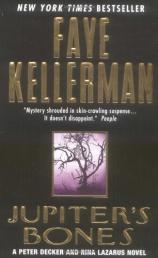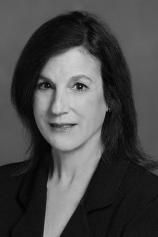Interview: October 8, 1999
October 8, 1999
TBR Reviewer Jill Zaklow dove into Faye Kellerman's novel JUPITER'S BONES with the relish of an avid fan and eagerly volunteered to do the interview. JUPITER'S BONES is the 11th book in Kellerman's popular Peter Decker and Rina Lazarus series, thrillers that always contain a family element that keeps things sizzling in and out of the Decker-Lazarus household. Find out if Kellerman will ever retire her fictional husband and wife team, the behind the scenes scoop about her own marriage (Faye is married to bestselling author Jonathan Kellerman) and more about her book JUPITER'S BONES in this interview.
TBR: Your new book JUPITER'S BONES is the 11th book you've written featuring Peter Decker and Rina Lazarus. Do you think you'll ever retire Decker, or can we expect to see him in future books? What is it that makes him and his wife Rina so appealing to your readers?
FK: I don't think I'll retire Decker as long as I can think of good stories featuring him as the protagonist. I have to make sure that he is the proper vehicle to tell my story. I think my readers related to Decker and Rina because they are real people to me. Not only do they talk to me --- tell me what to write --- but I consider them my friends as well.
TBR: You and your husband, Jonathan Kellerman, are both well known and well loved authors. What is it like to be married to a fellow writer? Do you give each other feedback on story ideas and/or your writing? Do you both have home offices?
FK: I can't talk about what it's like to be married to an "author," but I can tell you what it's like to be married to a bestseller, Jonathan Kellerman. It's great. He's my best friend and my favorite editor. But remember, he was my best friend for fifteen years before he became my editor. I think that's the key. We didn't get married as "writers." We were lovers way before Alex Delaware or Rina Lazarus was born. We never collaborate on our stories. But we do collaborate on life.
TBR: Your reoccurring main character Decker has married into an Orthodox Jewish family. Much of the plot revolves around the mystery he needs to solve, as well as religious and familial struggles. How does religion factor into your books? Into your own life?
FK: Religion is a major factor in my life. I consider myself a modern Orthodox Jewish woman with attachments to my synagogue, my children's religious school and the community at large. But Jonathan and I are also involved in other community causes, Children's Hospital of LA being a biggie. Jonathan worked there for fifteen years and it's an institution that holds a deep place in our hearts. Also, USC --- Jonathan's alma mater.
TBR: In JUPITER'S BONES, there is a lot of family angst going on --- Decker is having trouble with his teenage children, Jacob and Shayna. Have you ever considered writing straight fiction without a mystery angle?
FK: The family element in JUPITER'S BONES is something I am very proud of. I consider myself a family person with children of all ages. So I write from experience. I don't think of myself as writing mysteries. I consider myself a writer of fiction with a strong plot element. I think good books should have it all --- a riveting story peopled with characters that we care about.
TBR: The mystery in JUPITER'S BONES revolves around a Heaven's Gate-style religious cult. What do you think is the appeal of cults to certain people? What do you think about religions such as Scientology which are not cults per say, but seem to have a cult-like following?
FK: The cult in JUPITER'S BONES was largely fictitious, but it was based on elements of other cults, both small and well-known. I think cults thrive in people who feel devoid of spiritualism. I think religion thrives for that reason as well. My particular cult was nefarious because it was closed, refusing to let the insiders out and the outsiders in. The danger comes when cults are coercive. Religious freedom of the cult cannot impinge on civil rights of the individual.
TBR: What is the biggest challenge you find when beginning a new book?
FK: Starting a new book is like starting any relationship. In the beginning, it's all love, love, love. You're in love with your writing, you're in love with your characters, you're in love with your story. Then comes the middle where things get fuzzy. Just like a relationship, the hero worship is gone, and to succeed you have to work at it. Same as with a book. You have to work, work, work to pull everything together. The end is like a long-term relationship . . . like a good marriage. You know the characters, you know what's going on, you just have to slow down to prevent yourself from rushing. It's more or less like stopping and smelling the roses. Enjoy the process, not just the outcome.
TBR: What writers and books have influenced your career and your life?
FK: Some of my favorite writers are Jonathan Kellerman, Joseph Wambaugh, Raymond Chandler, Ross MacDonald, John D. MacDonald, Sue Grafton, Stephen King, Dean Koontz . . . those are the twentieth century people. Let's not forget Dumas, and Hugo and the Bronte sisters. I'm a sucker for Goth novels. There's nothing so appealing as a girl all alone in a scary house with a brooding storm over the horizon.
TBR: What advice would you give to aspiring writers?
FK: To aspiring writers, I say, "Write, write, write" as well as "read, read, read." Not just fiction, but nonfiction as well. You can never get enough information . . . so many stories out there. I just wish I had enough time.
TBR: What are your thoughts on the millennium?
FK: No thoughts on the millennium! I just want more of the same.




